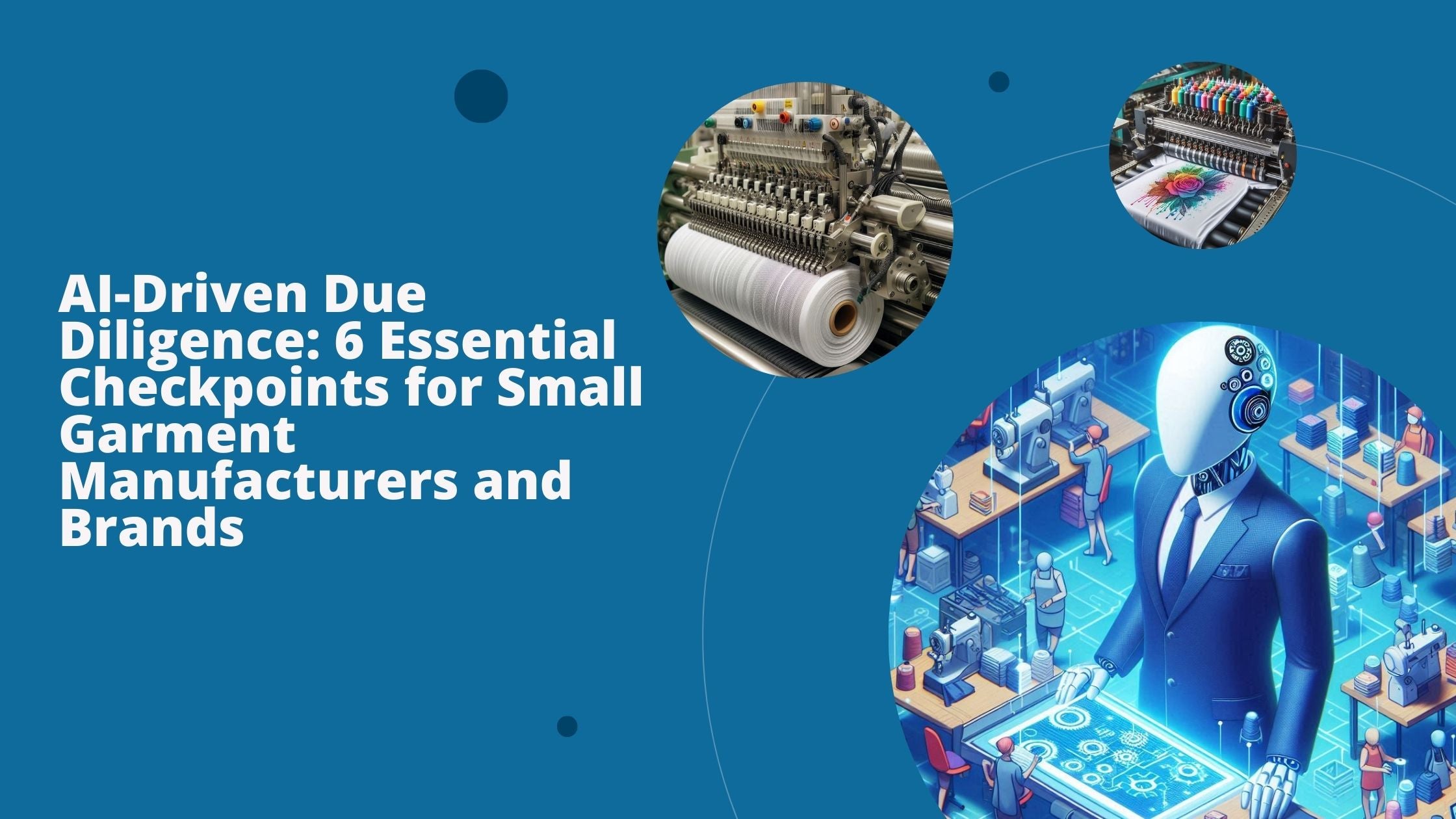AI-Driven Due Diligence: 6 Essential Checkpoints for Small Garment Manufacturers and Brands
| Oct, 08 , 24
Are your supply chain decisions risk-free? In our fast-paced garment industry, where efficiency and ethical compliance are paramount, ensuring your partners are trustworthy is more critical than ever. For small garment manufacturers and brands, navigating these challenges can be overwhelming, especially with limited resources and tighter margins.
AI technology has changed how businesses approach due diligence, offering tools that streamline processes, reduce risks, and provide actionable insights. While larger companies quickly adopted AI for these purposes, small garment manufacturers can leverage these innovations to protect their operations and ensure compliance.
This blog will explore six essential AI-driven checkpoints that small manufacturers and brands must implement for due diligence, from assessing supplier reliability to ensuring legal and ethical compliance. These steps will help small businesses build a resilient, conscientious, and efficient supply chain. Let us start with the basics.

What Is AI-Driven Due Diligence?
AI-driven due diligence leverages artificial intelligence to automate the evaluation of suppliers, partners, and business risks. It streamlines financial assessments, risk management, regulatory compliance checks, and ethical audits. Instead of relying solely on manual labor and traditional methods, AI can quickly process large data sets, predict potential risks, and flag concerns, helping businesses make informed decisions faster.
Relevance for Small Garment Manufacturers:
Performing comprehensive due diligence can be resource-intensive for small garment factories. It is challenging to vet suppliers or analyze every business decision because of time, labor, and financial limitations. AI automates these tasks, enabling smaller manufacturers to conduct rigorous evaluations and avoid costly mistakes, all while improving operational efficiency.
Checkpoint 1: Financial Health and Credit Risk
Automated Financial Analysis:
AI systems can evaluate the financial health of potential suppliers and partners by analyzing large datasets, including balance sheets, income statements, and cash flow reports. These insights ensure that small garment manufacturers are partnering with financially stable businesses.
Credit Risk Assessment:
AI evaluates credit risk by analyzing financial histories, payment patterns, and credit reports. It provides a clear view of whether a supplier would meet their financial obligations, reducing the chances of supply chain disruptions caused by failing partners.
Benefits for Small Garment Manufacturers:
Small garment factories should be selective in their partnerships to maintain financial stability. AI helps them avoid working with financially unstable suppliers, ensuring long-term associations that do not threaten their production timelines or cash flow.

Checkpoint 2: Regulatory Compliance
AI for Legal and Regulatory Checks:
AI-driven due diligence tools automatically monitor compliance with labor laws, safety codes, and environmental standards. Keeping up with the evolving landscape of local and international regulations can be daunting for small garment factories, but AI can continuously monitor and alert them to changes.
Avoiding Legal Risks:
By ensuring suppliers and partners comply with industry regulations, AI helps small garment factories avoid fines, legal penalties, or supply chain interruptions.
Example:
A small garment manufacturer in Europe once faced hefty fines for unknowingly partnering with a supplier that violated local labor laws. After implementing AI-driven compliance tools, the factory avoided similar risks by vetting new suppliers against regional legal standards.
Checkpoint 3: Ethical and Sustainability Audits
Ethical Supplier Screening:
AI tools can assess suppliers for ethical concerns such as fair labor practices and workplace safety. For small garment brands, ethical sourcing is increasingly important to customers, and AI can help ensure they only partner with responsible suppliers.
Sustainability Metrics:
AI analyzes suppliers' sustainability practices, assessing energy usage, waste management, and carbon emissions. As customers increasingly demand environmentally-friendly products, ensuring suppliers meet sustainability criteria can improve their reputation.
Small Business Perspective:
Ethical and sustainable sourcing can be a primary selling point for small garment brands. AI helps them assess suppliers efficiently, allowing them to align their sourcing practices with market expectations while still managing costs.

Checkpoint 4: Risk and Fraud Detection
AI for Risk Management:
AI-powered systems can detect fraud, corruption, or operational risks by analyzing patterns in data. These systems flag inconsistencies or unusual behaviors in supplier operations, allowing businesses to mitigate risks before they escalate.
Real-Time Monitoring:
Small garment factories often have limited bandwidth for continuous risk monitoring. AI systems provide real-time updates on potential risks, offering alerts when problems arise, whether related to financial instability or fraudulent activity.
Example:
A small garment factory partnered with a supplier that appeared reliable on the surface. However, their AI system detected irregularities in their financial data and flagged potential fraud, allowing the manufacturer to terminate the partnership before significant damage.
Checkpoint 5: Supplier Reputation and Performance History
Reputation Analysis:
AI systems can scrape the web for reviews, reports, and other public data, evaluating their reputation. They analyze social media chatter, industry news, and public feedback to assess the trustworthiness of potential partners.
Supplier Reliability:
In addition to reputation, AI evaluates suppliers based on performance history—such as past delivery times, quality consistency, and their ability to meet contractual obligations.
Benefits for Small Garment Manufacturers:
Reputation is vital when forming partnerships. For small garment manufacturers, understanding their past behavior can prevent future disruptions and ensure that production schedules stay on track. AI offers data-driven insights that might otherwise be hard to uncover manually.

Checkpoint 6: Cybersecurity and Data Protection
Cyber Risk Assessment:
AI-driven due diligence systems can assess potential cybersecurity risks, including data breaches or vulnerabilities in supplier networks. For small garment factories, safeguarding intellectual property and customer data is critical.
Supplier IT Systems Security:
AI can evaluate whether suppliers have adequate IT security measures to protect against cyberattacks, ensuring that small garment factories are not exposing their data to unnecessary risks.
Compliance with Data Regulations:
With global data protection regulations such as GDPR, ensuring that suppliers are compliant is crucial. AI systems can automatically assess supplier practices to ensure data privacy compliance, mitigating the risk of fines or reputational damage.
Challenges and Considerations for Small Garment Manufacturers
Cost of AI Implementation:
While AI can significantly streamline due diligence, the initial cost of implementation may be a hurdle for small garment factories. However, you have many scalable AI solutions, allowing businesses to start with tools and expand as needed.
Access to Data:
For AI systems to be effective, they need access to relevant data. Small garment factories may have less access to extensive datasets than significant manufacturers, but leveraging industry data from external sources can fill these gaps.
Human Oversight:
AI offers powerful insights, but you must combine these insights with human judgment. Small manufacturers should use AI to aid decision-making, not replace it, ensuring all aspects of due diligence.

Conclusion:
AI-driven due diligence has transformed how small garment manufacturers and brands approach risk management, supplier selection, and regulatory compliance. By leveraging AI technology, your business can gain deeper insights, reduce risk, and make more informed decisions, all while maintaining efficiency and profitability.
To ensure that your operations are fully protected and optimized, partnering with a reliable provider like EverLighten can make all the difference. Our expert services include:
- 100% Customization: Tailored solutions for your specific needs.
- 100% Quality Check: Ensuring top-tier quality across every stage.
- Free Design Help: Assisting with designs at no extra cost.
- Worldwide Delivery: Serving clients across the globe.
- 24/7 Support: Always available to assist with any queries.
- Unlimited Revisions: Refining your project until it is perfect.
- Low MOQ: Flexible options for businesses of all sizes.
Connect with EverLighten today and take the next step in streamlining your garment manufacturing process with AI-powered solutions.
FAQs
How can small garment manufacturers implement AI-driven due diligence?
Small manufacturers can start by adopting scalable AI tools that handle specific tasks like financial analysis, risk detection, and supplier audits. These tools can often integrate with existing systems, allowing gradual AI implementation.
What are the main risks AI can help detect in the supply chain?
AI can detect various risks, including financial instability, supplier non-compliance, ethical violations, fraud, and cybersecurity vulnerabilities, offering real-time updates to mitigate these threats.
Can AI ensure compliance with both local and international regulations?
Yes. AI systems can continuously monitor local and international regulatory requirements, helping businesses stay compliant and avoid penalties or legal risks.
How does AI assess the financial health of suppliers or partners?
AI analyzes financial statements, payment histories, and credit scores to assess the health and stability of potential partners, providing an accurate risk profile.
What is the cost of integrating AI for due diligence in a small garment business?
The price of the AI solution depends on its complexity. However, many affordable, scalable options are available for small businesses that can grow with the needs.

